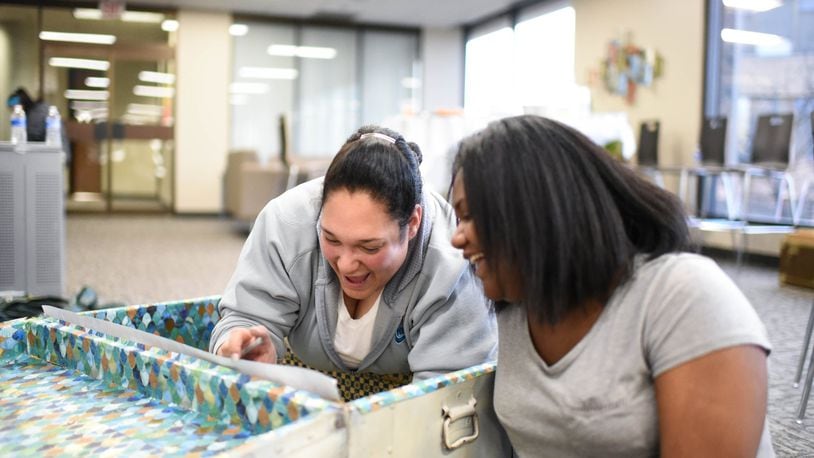Golden also conducted a poetry session for girls in the Clark County Juvenile Detention Center.
The mother-daughter program was sponsored by the Springfield Chapter of ZONTA International and the Clark County Department of Job and Family Services. They created poetry and restored old foot lockers and trunks.
This is the third consecutive year that Golden, who also works as a health researcher in Louisville, Ky., has assisted with this project.
“I’m lucky to be on board. This is really designed to connect, create together and talk in an open environment,” she said. “It’s to draw what’s going on in the participants’ minds and hearts and in the relationship.”
Golden guided the poetry, and Eshelman helped with a visual project of working on restoring the trunks they repainted and decorated with various themes such as music, old photos or characters.
Golden likes that writing can bring out feelings and ideas that can be more awkward to express face to face, such as a daughter saying how powerful and beautiful her mom is.
“One of the reasons we do this is there’s a lot of silence and there’s never not something that needs to be said and this can create breakthroughs,” Golden said.
Odysyee Wilkerson worked with daughters Xhacaju and Ziaira on the projects, and brought them closer together, she said.
Odysyee grew up in hard circumstances and dealt with it by journaling. She recently encouraged Xhacaju to journal as well.
Poetry seemed like the next step for both.
Part of the program included the participants reading their poetry in front of around 45 people, which took courage, but paid off in multiple ways, they said.
“There are moments I’ve hindered myself. I wanted to set an example for her,” said Odysyee. “I’m tired of being quiet. I got to see her shine in a way I hadn’t, and it was a stepping stone for her in not being reclusive like I was.”
In turn, Xhacaju learned more about her mom. She said writing was both easy and difficult.
“It was about trying to find the right words for what I wanted to say,” she said.
When those words did come, they were preserved.
“I believe in miracles & the blessings that come with them” is emblazoned on the trunk they restored to recall this special time together for as long as they own the trunk.
Project Jericho manager Lauren Houser sensed some of the participants were hesitant speaking in front of strangers, but it was part of the growth the program promotes.
“It took courage to stand in front of 45 people and share your work. But you worked hard all week and they experienced your bravery and talent,” Houser said.
Project Jericho is a program of Clark State Community College supported through funding from Clark County Department of Job and Family Services, Clark County Juvenile Court, the Ohio Arts Council, the Turner Foundation and private contributions.
The goal at the detention center was to relieve stress, help group dynamics and let their voices be heard as well, according to Golden.
Participants in both programs will receive printed anthologies of their poetry.
Golden said Project Jericho has influenced her career path, and she uses it as a model during her travels around the country.
“Project Jericho has the vision to honor the work being created,” she said.
About the Author
